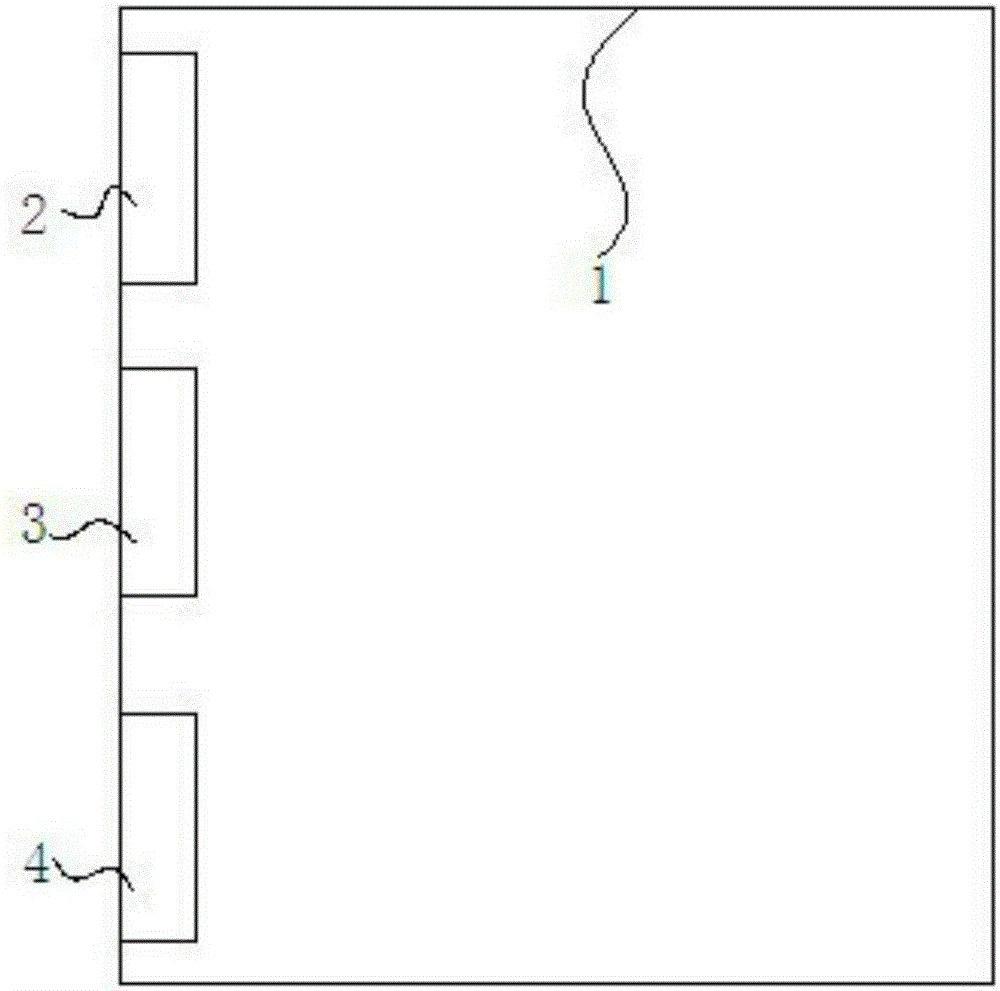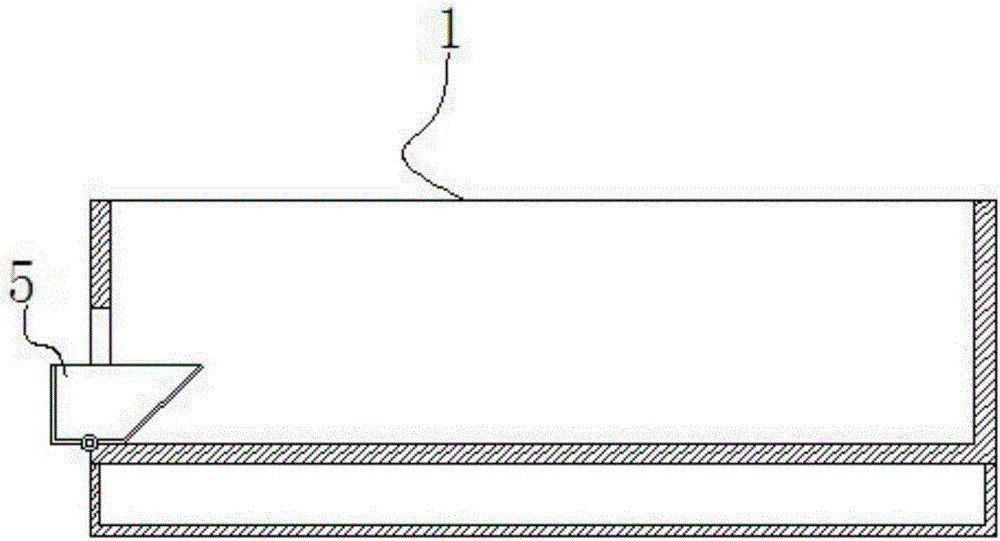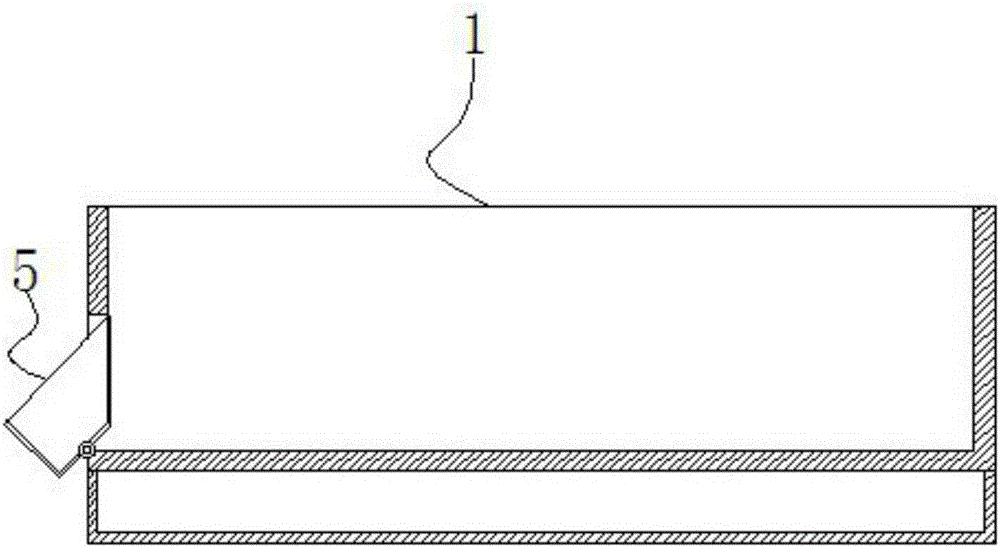Captivity-stocking combined sheep culture method
A breeding method and technology of sheep pens, applied in the field of sheep breeding, can solve the problems of reducing the quality and efficiency of sheep raising, high labor intensity of feeding, and reducing the efficiency of sheep raising, so as to prevent stomach distension and stomach pain, reduce activity burden, and improve immunity force effect
- Summary
- Abstract
- Description
- Claims
- Application Information
AI Technical Summary
Problems solved by technology
Method used
Image
Examples
Embodiment 1
[0031] A method for breeding sheep combined with pens and pens. Sheep pens are raised in sheep pens 1, and three kinds of feed tanks 5 are arranged in the sheep pens, which are respectively coarse feed tanks 2, fine feed tanks 3, and fine feed tanks 4; the coarse feed tanks Coarse material is placed in the tank 2; fine material is placed in the fine material tank 3; fine material is placed in the fine material tank 4; the coarse material includes the following raw materials in parts by mass: 0.3 parts of camphor leaves, mulberry leaves 0.4 parts of leaves, 0.6 parts of leaves, 0.6 parts of leaves, 1.25 parts of chestnut leaves, and 0.75 parts of oak leaves; the fine material includes the following raw materials in parts by mass: 0.75 parts of imperial bamboo grass, 1 part of milk vetch, 0.4 parts of wild kiwifruit, 0.75 parts of clover, 1.5 parts of sorghum, 1.5 parts of red clover, 0.25 part of ground hibiscus, 0.5 part of kudzu vine, 1.5 part of sweet potato vine, and 0.6 par...
Embodiment 2
[0039]A method for breeding sheep combined with pens and pens. Sheep pens are raised in sheep pens 1, and three kinds of feed tanks 5 are arranged in the sheep pens, which are respectively coarse feed tanks 2, fine feed tanks 3, and fine feed tanks 4; the coarse feed tanks Coarse material is placed in the tank 2; fine material is placed in the fine material tank 3; fine material is placed in the fine material tank 4; the coarse material includes the following raw materials in parts by mass: 0.2 part of camphor leaf, mulberry leaf 0.3 parts of leaves, 0.4 parts of leaves, 1.5 parts of chestnut leaves, and 1 part of oak leaves; the fine material includes the following raw materials in parts by mass: 1 part of Huangzhucao, 1.2 parts of milk vetch, 0.5 parts of wild kiwifruit, 0.5 part of clover, 2 parts of sorghum, 1 part of red clover, 0.2-part of ground hibiscus, 0.3 part of kudzu vine, 2 parts of sweet potato vine, and 0.8 part of corn stalk; the coarse material tank 2 remains ...
Embodiment 3
[0047] A method for breeding sheep combined with pens and pens. Sheep pens are raised in sheep pens 1, and three kinds of feed tanks 5 are arranged in the sheep pens, which are respectively coarse feed tanks 2, fine feed tanks 3, and fine feed tanks 4; the coarse feed tanks Coarse material is placed in the tank 2; fine material is placed in the fine material tank 3; fine material is placed in the fine material tank 4; the coarse material includes the following raw materials in parts by mass: 0.4 part of camphor leaf, mulberry leaf 0.5 parts of leaves, 0.8 parts of leaves, 1.5 parts of chestnut leaves, and 1 part of oak leaves; the fine material includes the following raw materials in parts by mass: 1 part of Huangzhucao, 1.2 parts of milk vetch, 0.5 parts of wild kiwifruit, 1 part of clover, 2 parts of sorghum, 2 parts of red clover, 0.3 part of ground hibiscus, 0.8 part of kudzu vine, 2 parts of sweet potato vine, 0.8 part of corn stalk; 3 Keep it closed at 23:00-6:00, and op...
PUM
 Login to View More
Login to View More Abstract
Description
Claims
Application Information
 Login to View More
Login to View More - R&D
- Intellectual Property
- Life Sciences
- Materials
- Tech Scout
- Unparalleled Data Quality
- Higher Quality Content
- 60% Fewer Hallucinations
Browse by: Latest US Patents, China's latest patents, Technical Efficacy Thesaurus, Application Domain, Technology Topic, Popular Technical Reports.
© 2025 PatSnap. All rights reserved.Legal|Privacy policy|Modern Slavery Act Transparency Statement|Sitemap|About US| Contact US: help@patsnap.com



